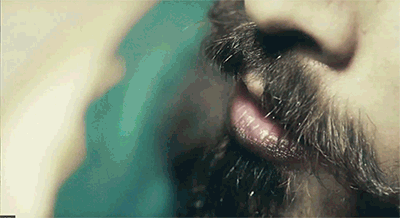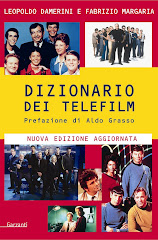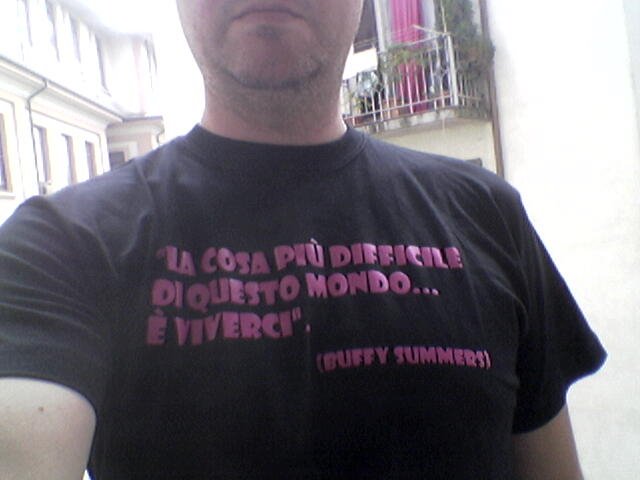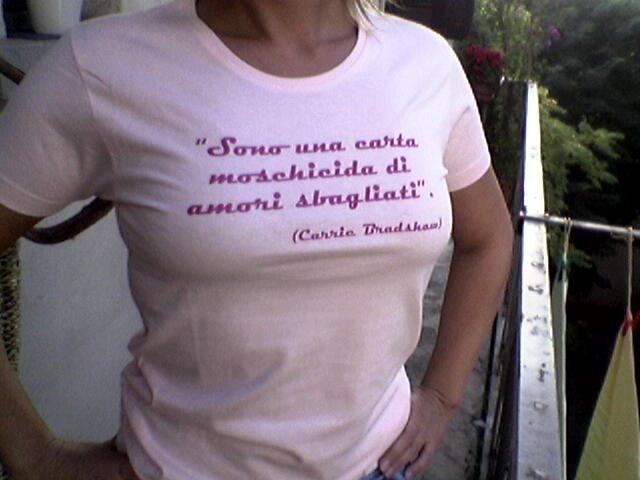NEWS - Ecco perchè "Game of Thrones" è la serie tv di cui parlano tutti. Molto più del noioso, seppur popolare, "The Walking Dead", dove non succede mai niente...
Articolo di
Josh Kurp su "
Uproxx"
“So, what do you do for a living?”.
It’s a question you get on first dates, during lunch breaks, at the
doctor’s office. I heard it earlier this week, while waiting in line for
a drink. “I create #content” was too sarcastic of an answer, so I went
with, “I write about television.” The response, especially lately,
usually goes one of two ways: “Tell me a show I should be watching” (my
current answer is
You’re the Worst or
BoJack Horseman, because I love making people laugh, then depressing the hell out of them), or, “I’ve been watching
Game of Thrones, and…” It’s never “I’m watching
The Big Bang Theory, and…” (I’d probably walk away), or “I’m watching
House of Cards, and…” It’s almost always
Game of Thrones, because
Game of Thrones is the only show everyone watches.
Okay, that’s not literally true —
“The Door” was
“only” seen by 7.89 million people, although that’s the highest
non-premiere or –finale episode in the show’s history — but it sure
seems like it. Look at the way the Hodor reveal took over Twitter, and Facebook, and the whole internet.
It even permeated into scary real life. I got the “What do you do for a
living?” question from a bartender, who after I gave my answer, went
down the “show I should be watching” route. I replied, and, completely
unprompted, he asked me, “Do you watch
Game of Thrones?” I do.
“I don’t, not since season one. I don’t have the time. But I heard
something big happened last night.” We then spent the next five minutes
talking about a series he hadn’t seen in five years. (Don’t worry, there
was no one waiting for a drink behind me.) There is no other show on
right now that dominates small talk like
Game of Thrones.
Back in the 1990s, this wasn’t the case.
Friends,
Seinfeld, E.R.
— these were the water cooler shows, the ones that Gary from marketing
and Linda from shipping and receiving, and a staggering 25 million other
people, would come into the office the next day quoting. (It was even
more dramatic in the 1970s.
All in the Family averaged 34
million viewers in 1971-72 — there were only 207 million people living
in the U.S.) Eventually, these conversations moved online, with some
exceptions.
Lost was a dream come true for your cubicle mate, and a nightmare for you, who had to listen to her insane theories.
Breaking Bad was a critical darling that turned into a national sensation.
Mad Men and
The Sopranos inspired cocktail parties and raucous Italian dinners, thrown by people who misinterpreted
Mad Men and
The Sopranos. But all those shows are now gone, as is the idea of a “water cooler show.”
Here’s
Boardwalk Empire‘s
Terence Winter, speaking to the
New York Times:
It always blows my mind when you think of the water
cooler moments of our childhood, where everybody knows the same
reference, say, in All In the Family or I Love Lucy and The Honeymooners.
Literally, you can count on every adult of that era understanding what,
“Pow, right in the kisser,” means. Now, because of the niche quality
viewing, you’ve got, at least on cable shows, a much smaller amount of
people who don’t have that. It’s going to be interesting to see 40 years
from now if there’s going to be little groups of people who know
references to certain shows; whereas before, everyone knew the same
songs, the same jokes, the same routines.
The one exception:
Game of Thrones. It commands next-day
conversations, it gives people who otherwise have nothing in common
something to dissect, and it’s just about the only show most people
watch the night it airs (largely for fear of spoilers). That’s an
impressive feat, considering DVRs, streaming services, and DVDs and
Blu-rays have effectively destroyed the communal experience of watching
“live” TV. I don’t worry about having 10 episodes of
New Girl
on my DVR, because I know people have 12 episodes on theirs. Time slots
barely matter anymore. This is not a bad thing. Do you want to go back
to a time when you had to leave a party early to catch an all-new
Friends? But it’s still nice that one “must get home” show exists.
Why
Game of Thrones, though, and not, say,
The Walking Dead?
AMC’s zombie series is the biggest thing on television. It surely has
to count. Well, yes and no. It’s extremely popular, but, based on
conversations I’ve had with friends and strangers alike, it seems like a
lot of people, including Alan Sepinwall, have quit
The Walking Dead.
And that was before the Negan cliffhanger. It’s too slow, it’s too
boring, nothing ever happens. These are all common complaints, most of
which I disagree with. But the reason
The Walking Dead doesn’t count as a small talk show is because there’s really nothing to talk about. The fun of watching
Game of Thrones
is guessing where the show is going, wondering who’s going to end up on
the Iron Throne, or debating whether the writers “should have done
that.” (Okay, the extracurricular controversies aren’t exactly “fun,” but they do provide fodder for think pieces and podcast arguments.) It’s tougher to come up with
Walking Dead
theories, outside of, “I think [blank] was killed by Negan. Here’s
why.” The whole point of the series is that there is no point — the
characters aren’t looking for a cure; they’re just going to keep killing
walkers until AMC says no more.
As for other potential small talk shows:
–
House of Cards,
Orange Is the New Black, and
Daredevil,
while occasionally thrilling, are all on Netflix, meaning you can watch
them at your pace. It could take months. Which reminds me, I need to
finish
Daredevil season two…

–
Mr. Robot,
The Americans,
Rectify, and
Fargo
are four of the best shows on television. They’re also only watched by
the small number of people who regularly tweet about how they’re four of
the best shows on television.
–
Better Call Saul is set in the same universe as
Breaking Bad,
but it doesn’t have the same sense of urgency. Plus, the tone’s more
comedic, and unlike Walter White, who fans were torn on whether he
should live or die in the finale, we know Saul Goodman, er, Jimmy McGill
makes it.
–
True Detective was a “small talk” show in season one. It was a disaster in season two. (
Homeland also lost a lot of its cache since season one.)
–
Fear the Walking Dead? Yeah, no.
is really the only show that fits every criteria — it’s like No
One/Arya’s list, when (not if, but when) she kills Cersei, Gregor, and
Walder Frey. Is it popular? Check. Do viewers watch it live? Check. Do
people have loud opinions about it? Check. Does it beg for theories?
Check. Is there outside text for fans to annoyingly say, “Well, in the
books…”? Check. Is it immediately quotable, so that the guy who still
occasionally breaks out a “
my wife” can update his material with “I drink, and I know things”? Check.
We’re more engaged with television than ever, but that engagement
takes place on social media, or in comment sections, not in real life.
There’s simply too much TV (#TooMuchTV) for everyone to keep up with
everything worth keeping up on. But for 10 weeks of the year, on Sunday
nights at 9 p.m. EST, millions of TVs and laptops are tuned to HBO or
HBO Go.
Game of Thrones is a show obsessed with death, but it’s keeping TV small talk alive.

































.jpg)




.jpg)













